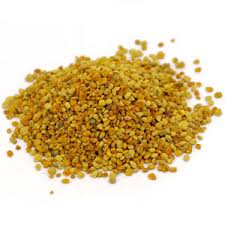 Bee pollen is a coarse powder which is collected during the pollination process on the outer surface of the bee. Containing the microgametophytes of seed plants, pollen grains has a hard coat to protect the sperm cells during their transport on bees and other insects. As bees return to their nest, they pack the pollen into large granules, which are then harvested by humans. During this packing process, the pollen is mixed with nectar, enzymes, and organisms that transform the pollen into “bee bread”. The resulting material contains a food which is higher in nutrition content than untreated pollen. While a popular nutrition supplement today, Bee Pollen is also the primary source of protein for the hive
Bee pollen is a coarse powder which is collected during the pollination process on the outer surface of the bee. Containing the microgametophytes of seed plants, pollen grains has a hard coat to protect the sperm cells during their transport on bees and other insects. As bees return to their nest, they pack the pollen into large granules, which are then harvested by humans. During this packing process, the pollen is mixed with nectar, enzymes, and organisms that transform the pollen into “bee bread”. The resulting material contains a food which is higher in nutrition content than untreated pollen. While a popular nutrition supplement today, Bee Pollen is also the primary source of protein for the hive
Key Nutrients
Bee Pollen is packed with vitamins including vitamin A, riboflavin, niacin, vitamin C, E and D. Bee pollen also contains a very high amount of minerals including calcium, potassium, iron, iodine and zinc.
Health Benefits
Vitamin A – Vitamin A, when converted into retinaldehyde, is a vital compound for healthy eyes. Furthermore, vitamin A is believed to fight against cataracts, macular degeneration and glaucoma. Vitamin A strengthens the membranes of the human body such as mucous membranes, respiratory, urinary and intestinal tracts. It is also essential for the lymphocytes, or white blood cells, that fight infection once in the body.
Vitamin C – Regular consumption of foods rich in vitamin C helps the body develop resistance against infections and scavenges harmful, pro-inflammatory free radicals. Vitamin C also helps to prevent respiratory problems such as asthma and lung cancer. Vitamin C has been shown to lower blood pressure, and therefore lessen the probability of hypertension.
Vitamin E – Research has shown that vitamin E possesses anti-inflammatory effects that can combat arthritis, rheumatism, asthma, and other inflammatory disorders linked to chronic inflammation. Vitamin E also improves the body’s metabolic function.
Vitamin B1 – Thiamine is an important vitamin since it breaks down sugars in the body. Thiamine also helps to support nerve and heart health.
Vitamin B6 – Vitamin B6 helps to keep your immune system in good working order. It aids in the breakdown of fats, carbohydrates and amino acids while helping to maintain the health of lymph nodes. Additionally, vitamin B6 helps to regulate blood glucose levels.
Vitamin B9 – Folate is an important vitamin for liver function.
Vitamin B12 – Vitamin B12, or folic acid, helps to preserve neurological function and DNA synthesis. It also plays a key role in the health of red blood cells. The nervous system relies on vitamin B12 for proper function as well.
Potassium – Potassium is an essential mineral which aids in fluid regulation, protein synthesis and cardiovascular health. High levels of potassium are associated with reduced risk for stroke, improved blood pressure control as well as bone health.
Iron –Iron, found in red blood cells, is an integral part of hemoglobin. Hemoglobin carries oxygen from the lungs to the cells. Iron is an essential component of many enzymes necessary for various chemical reactions in the body.
Calcium – Calcium is an important mineral for bone and teeth growth and maintenance. It is also an important mineral in terms of cardiovascular function.
Zinc – The health benefits of Zinc include proper functioning of immune system, digestion, control of blood sugar and energy metabolism.
Iodine – Iodine is an important mineral responsible for healthy thyroid function.
Season
Bee Pollen can be found in any supermarket or food retail store year round.
Nutrition Information
Per 1 teaspoon:
Calories (cKal): 16
Protein (grams): 1.2
Total Fat (grams): .25
Carbohydrates (grams): 2.2
Fiber (grams): .38
Buying and Storing
Bee pollen should be purchased from a reputable supplier or supermarket. Being dried, bee pollen will store for up to six months.
Best Way to Add to Diet
Bee pollen can be used as a direct supplement, or makes a great topping for any salad or fish. Add bee pollen to a dessert recipe or baked good, or sprinkle the top of your food with some bee pollen for a bit of extra color.
Bee Pollen Recipe
Strawberries Stuffed with Bee Pollen

 Not Sure What Healthy Foods To Eat?
Not Sure What Healthy Foods To Eat? This week we take a look at one of my favorite healthy foods...the mighty Avocado.
This week we take a look at one of my favorite healthy foods...the mighty Avocado.
No comments yet.